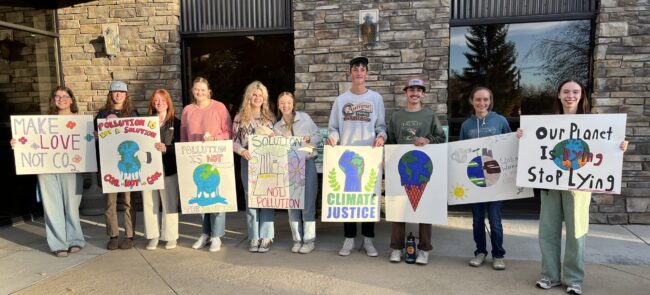By Derf Johnson
 Hundreds of people turned out for the MEPA hearings during the fall, including these high school climate activists in Helena. Photo by Anne Hedges.
Hundreds of people turned out for the MEPA hearings during the fall, including these high school climate activists in Helena. Photo by Anne Hedges.
Late last summer, the Montana Department of Environmental Quality (DEQ) announced a series of listening sessions and the future creation of a working group to evaluate different aspects of the Montana Environmental Policy Act (MEPA). MEPA is Montana’s cornerstone environmental law that guarantees a “look before you leap” evaluation of major projects that could potentially impact Montana’s environment. This past fall, folks from across Montana packed hearing rooms in Billings, Helena, and Missoula, as well as remotely, and provided comments on the importance of MEPA. If the listening sessions are any indication of Montana’s sentiment on MEPA, then it’s clear that Montanans want the bedrock law to be bolstered and strengthened, and that we clearly and unequivocally want DEQ to evaluate climate change as part of its duties under MEPA.
Now that the listening sessions have wrapped up, the DEQ has created a “MEPA Work Group” that is tasked with further discussing and evaluating MEPA and potentially offering recommendations on improving the process. The initial, organizing meeting for the Work Group occurred in January, and there are four scheduled for Feb. 26, March 18, April 29, and May 29. These meetings are open to the public, and the Work Group will also accept comments from the public at the end of every meeting. Additionally, three subgroups will also meet regularly and potentially offer recommendations to the full Work Group. These include the Public Engagement and Education Subgroup, the Climate Analysis Subgroup, and the Process and Applicability Subgroup. For more information, a calendar for the different meetings, and information on how you can participate as a member of the public, visit www.deq.mt.gov/about/MEPA.
In large part, the MEPA Work Group was a response by DEQ following the Held v. State of Montana case, a District Court case brought by Montana youth. In that case, the judge ultimately struck down a number of unconstitutional laws prohibiting a robust MEPA process and the evaluation of climate change, and ordered that the DEQ must consider climate change impacts in its MEPA review in order to satisfy requirements under Montana’s constitutional right to a clean and healthful environment. Notably, the case is now appealed to the Montana Supreme Court, but the court declined to “stay” the district court ruling, meaning that the DEQ is currently required to consider climate change impacts as part of its analysis.
It is incredibly important that members of the Work Group — including MEIC Deputy Director Derf Johnson — and DEQ hear from the public about the important environmental and public participation requirements that MEPA provides. It will also be important for DEQ to hear from the public that it needs to consider the serious consequences of climate change in its permitting actions and that it can do so (and is legally required to do so) today. For more information on the MEPA Work Group process, contact Derf Johnson: djohnson@MEIC.org.
This article was published in the March 2024 issue of Down To Earth.

